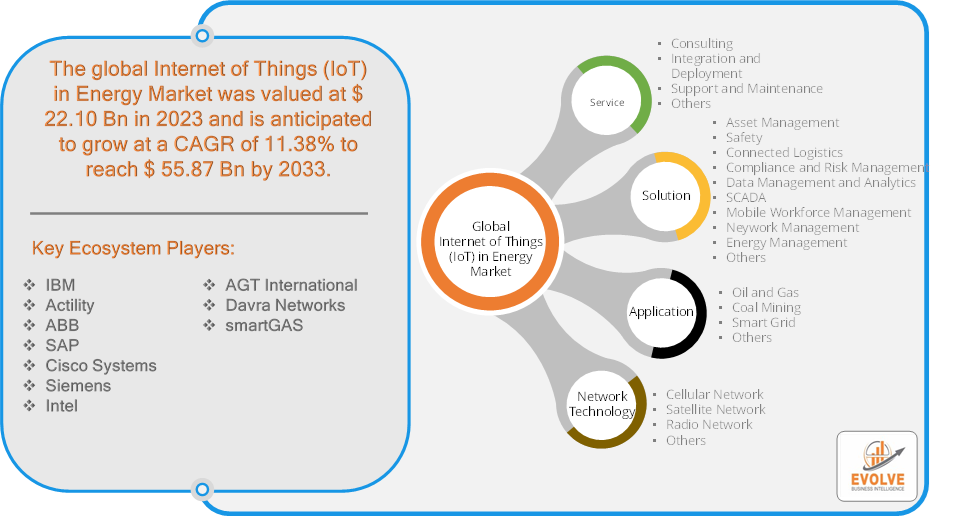Blog
IoT in Energy Market Surges: 11.38% CAGR

Evolve Business Intelligence has published a research report on the Global Internet of Things (IoT) in Energy Market, 2023–2033. The global Internet of Things (IoT) in Energy Market is projected to exhibit a CAGR of around 11.38% during the forecast period of 2023 to 2033.
Evolve Business Intelligence has recognized the following companies as the key players in the global Internet of Things (IoT) in Energy Market: IBM, Actility, ABB, SAP, Cisco Systems, Siemens, Intel, AGT International, Davra Networks and smartGAS.
 More Information: https://evolvebi.com/report/internet-of-things-iot-in-energy-market-analysis/
More Information: https://evolvebi.com/report/internet-of-things-iot-in-energy-market-analysis/
Market Highlights
The Global Internet of Things (IoT) in Energy Market is projected to be valued at USD 55.87 Billion by 2033, recording a CAGR of around 11.38% during the forecast period. The Internet of Things (IoT) in the Energy Market refers to the use of interconnected devices, sensors, and software to monitor, analyze, and optimize energy production, distribution, and consumption. IoT technology enables real-time data collection and communication between devices, leading to more efficient and sustainable energy management.
By leveraging IoT, the energy market can achieve greater efficiency, reliability, and sustainability, ultimately contributing to a more resilient and eco-friendly energy ecosystem.
The COVID-19 pandemic had a significant impact on the Internet of Things (IoT) in the Energy Market. The pandemic accelerated the adoption of digital technologies, including IoT, as energy companies sought to improve remote monitoring and control of energy assets. This shift enabled continued operations despite restrictions on physical presence. With travel and onsite restrictions, IoT devices became crucial for remote monitoring and management of energy infrastructure. This allowed companies to maintain service continuity and operational efficiency while ensuring employee safety. The pandemic caused disruptions in global supply chains, affecting the availability of IoT components and devices. This led to delays in project implementations and increased costs for some IoT deployments. The rapid increase in IoT device deployment raised concerns about data security and privacy. Energy companies had to invest in robust cybersecurity measures to protect critical infrastructure from potential cyber threats. The pandemic reinforced the importance of sustainable energy solutions. IoT helped optimize the integration and management of renewable energy sources, contributing to a more sustainable energy future.
Segmental Analysis
The global Internet of Things (IoT) in Energy Market has been segmented based on Service, Solution, Application and Network Technology.
Based on Service, the Internet of Things (IoT) in Energy Market is segmented into Consulting, Integration and Deployment, Support and Maintenance, Others. The Integration and Deployment segment is anticipated to dominate the market.
Based on Solution, the Internet of Things (IoT) in Energy Market is segmented into Asset Management, Safety, Connected Logistics, Compliance and Risk Management, Data Management and Analytics, SCADA, Mobile Workforce Management, Network Management, Energy Management and Others. The Network Management segment is anticipated to dominate the market.
Based on Application, the Internet of Things (IoT) in Energy Market is segmented into Oil and Gas, Coal Mining, Smart Grid and Others. The Coal Mining segment is anticipated to dominate the market.
Based on Network Technology, the global Internet of Things (IoT) in Energy Market has been divided into the Cellular Network, Satellite Network, Radio Network and Others. The Radio Network segment is anticipated to dominate the market.
More Information: https://evolvebi.com/report/internet-of-things-iot-in-energy-market-analysis/
Regional Analysis
The Internet of Things (IoT) in Energy Market is divided into five regions: North America, Europe, Asia-Pacific, South America, and the Middle East, & Africa. North America has a well-developed energy infrastructure that supports the integration of IoT technologies. The region is a leader in smart grid development and renewable energy integration. Many leading IoT technology companies and energy firms are based in North America, fostering innovation and investment in IoT solutions. Due to the advanced deployment of IoT technologies, there is a strong emphasis on cybersecurity to protect critical infrastructure from cyber threats. Europe is at the forefront of implementing IoT in the energy market to meet ambitious sustainability and carbon reduction goals. The region has strong regulatory support for renewable energy and energy efficiency. European cities are actively investing in smart city projects that leverage IoT for efficient energy management and reduced emissions. The rapid urbanization and industrialization in the Asia-Pacific region drive demand for efficient energy management solutions. IoT plays a crucial role in meeting these demands. Governments in countries like China, Japan, and South Korea are investing heavily in smart grid technologies and renewable energy, supporting the growth of IoT in the energy sector. Many countries in the Middle East and Africa are investing in renewable energy projects, with IoT playing a role in optimizing these investments. There is a need for significant investment in energy infrastructure, which presents opportunities for IoT solutions to improve efficiency and reliability. Latin America is an emerging market for IoT in energy, with growing interest in renewable energy and smart grid technologies. Limited infrastructure and connectivity in some areas can pose challenges to the widespread adoption of IoT technologies.



